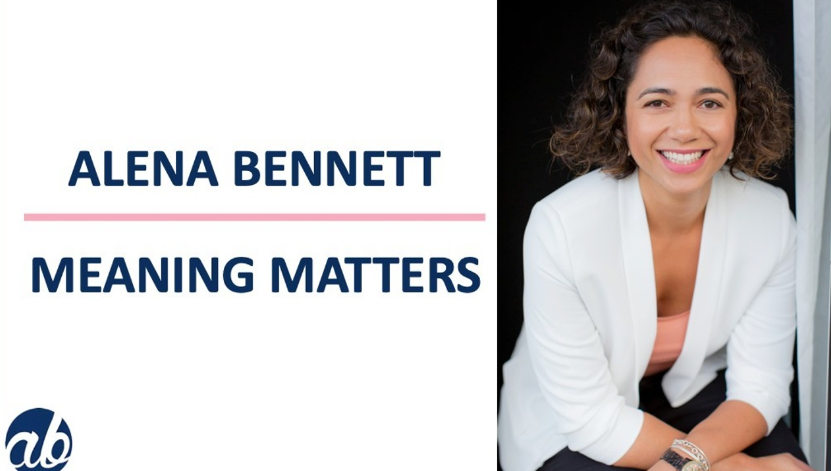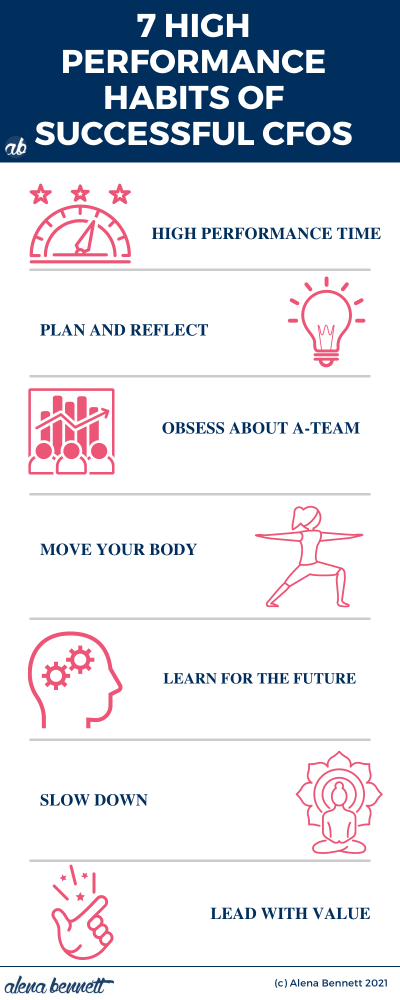There's a reason why new year's resolutions fail: failure to implement. The same can be said for implementation of new ideas both at home and at work - it's hard because it requires the undoing of something that you're comfortable and familiar with, and replacing that action with something else. Quite often, however, the challenge is knowing what the 'new' habit should be.
As you are getting back into the swing of things at work, I thought I'd share the habits of some of my CFO clients that you might wish to incorporate into your definition of high performance - that is, your own High Performance Habits (HBH).
High Performance Habit #1: They have high performance time
One of my clients, Dan, has one "High performance day" each week. This is the day he devotes to his higher order strategic thinking, his own performance and the day he thinks about how his team are operating. It's the same day each week and coincides with his work from home day. If you want to apply this concept, know that it doesn't need to be a whole day (in fact, you're probably reading this incredulously thinking 'what? A whole day?!'), but the concept of 'cordoning off' a period of high performance time each week might just be the thing that shifts the dial for you each week.
When will you have your high performance time?
High Performance Habit #2: They plan and reflect as part of their weekly routine
Bookending your week (and even your day) with planning and reflection is a fantastic way to ensure that you stay on top of things. This might sound a bit like HPH#1, but it's slightly different in the sense that your focus is on the activities approaching in the week ahead, and the ones in the week just gone. You might like to try the 'Friday final hour' technique I shared in a previous article or adopt the short cut version.
Want a great method for daily planning and reflection that takes less time than getting your daily coffee? I love Peter Bregman's method in his book "18 minutes: Find your focus, master distraction and get the right things done".
High Performance Habit #3: They obsess about their A-team
One of my CFOs was struggling with the disconnect between the trajectory of the organisation and the capability of his finance team. He had a couple of star players, but on the whole his view was that this was not the team he or the organisation needed to deliver success. Over the course of the year we worked together with his star players - the ones that had the ability to be the 'change makers'. Despite the challenges faced through the year-ends, the project milestones and the Board meetings, my client never lost sight of his vision of the A-team and this helped him identify the steps he needed to take to make it happen. Picking up with him in the new year, I was absolutely delighted to learn that he has a core nucleus firmly in place and he now feels confident about the year ahead.
Do you have your A-team?
High Performance Habit #4: They move their body
During a team offsite session I facilitated, I asked a finance leadership team to share with each other the best team they had ever been in: work, or otherwise and in particular, how they would describe their version of a dynamic team. It's probably no surprise that most shared a sporting team that they had been in, but I loved the CFO's description of what it meant to be in a dynamic team. He related the feeling to his Saturday morning rides with his bike group: when you get in that slip stream and everyone's focused, they're riding fast and they have implicit trust in each other, knowing that one slight move might be the beginning of the end. Even though I'm not an avid rider, I got it. High performing CFOs know that keeping their body fit is a precedent to mind-fitness, and so they move their body regularly. In fact, I used to work out alongside our CEO at the staff gym. At first I was a bit embarrassed having him bear witness to me on a treadmill, but I realised we were there for the same reason - it made us perform at our best. So whether it be a daily gym session, morning yoga or walk, regular exercise is undoubtedly a key high performance habit.
How do you help your body help your mind?
High Performance Habit #5: They have a view for their future
The best CFOs didn't become the best by accident. They are intentional and approach every day that way. They 'create it until they make it' and this starts first with a vision and a sense of purpose. They have a love of learning and an openness to self-improvement. They have a plan....but at the same time can 'play' with that plan, insomuch as they never really look bound or constrained by it. In fact, their vision and the plan to achieve that vision sets them free. This gives that characteristic uncanny ability to have perspective even during the toughest of crunch times.
Do you have a vision of your legacy?
High Performance Habit #6: They slow down
Have you ever felt that you have too many thoughts to occupy your brain? And when you start talking, they all tumble out in a fairly incoherent and not fully thought out way? Don't worry , you're not alone. The generally accepted cognitive load for a CFO likely sits at around 110%, but if you take a step back and think of the consequences of not being able to think clearly in this role...it's dire. That's why the best CFOs take the time to slow down and meditate. A wonderful client of mine, Tony, shared the profound impact meditation had on his professional life and his personal life, after commencing the practice last year. He now professes this is a critical success factor for him and his performance.
How do you slow down and allow yourself to think deeply?
High Performance Habit #7: They create habits that make it look effortless
At their peak, CFOs know with clarity the value they bring to an organisation. It's the reason they are headhunted for particular roles, it governs their decision making process and it's the single biggest vehicle they drive success through. With no one within your organisation to benchmark yourself against, it's hard to showcase your value if you don't know what it is. What I find is that when CFOs know their value and create structures, rhythms, and forums around it, their value is amplified in almost an effortless fashion.
How do you ensure your value is....valued?
Which of these high performance habits do you already do?
Which of these high performance habits sound useful to you?
Which of these high performance habits will you commence tomorrow?


